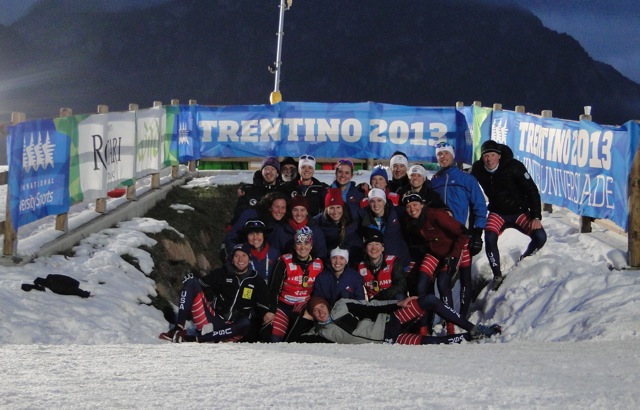
The University of Wyoming has a unique ski team. Competing in the U.S. Collegiate Ski Association (USCSA) but also as an affiliate member of the Rocky Mountain Intercollegiate Ski Association (RMISA), the Western division of NCAA skiing, the team bridges a lot of ground.
Their roster boasts skiers who competed at Junior Nationals in high school. It also includes athletes who had never skied before college. The squad is run not only as a sports team, but as a college course with an integrated curriculum for which athletes receive grades and credits. When it comes time for team selection, most spots are based on speed but a few are based on “Steamboat Points”, named after the university mascot and consisting of GPA, volunteer work, and practice attendance, among others.
Oh, and one more thing: the team will be representing the United States at the World University Games in January, its third such trip. This year the competitions will be held in Slovakia in late January. Olympians and World Cup athletes will likely be in attendance; past podium finishers include Justyna Kowalczyk, Nikolay Chebotko, Maxim Vylegzhanin, Yulia Tchekaleva, Bettina Gruber, and Baptiste Gros.
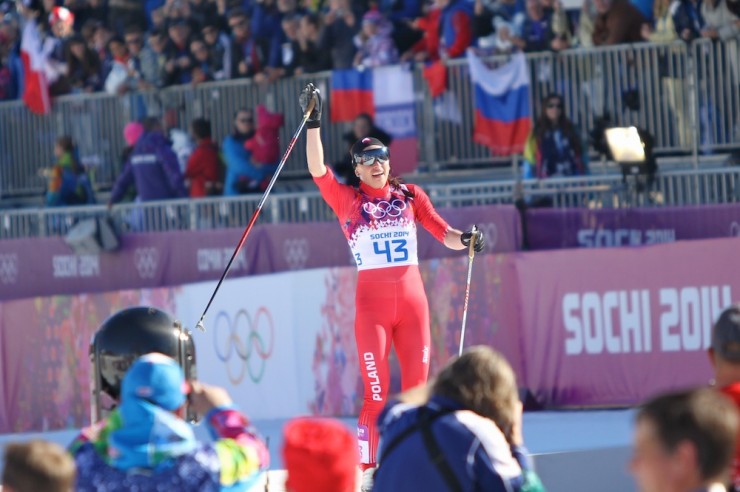
“Every year we don’t expect to be asked to do it again,” said Christi Boggs, one of the team’s co-coaches. “We assume that at some point some forces will come together and we won’t be asked. And that’s fine – we’ll do it when we have the opportunity, and when we don’t, we’ll do something else.”
UW has won four men’s national titles since 2006 and six women’s titles since 2003. Boggs believes that their success at USCSA nationals is what prompted the United States International University Sports Federation (US-IUSF) to offer them the spot. (The United States Olympic Committee used to manage World University Games trips and selection, but abruptly cut all funding for it just before the 2009 Games).
But when they reach the world stage, things go to a whole different level.
“It’s a very interesting field because last year we literally had people who made Olympic teams racing,” Boggs said. “The Russians use this as a ‘B’ team competition, so they send their B team, which is freaking fast. They’re not really students, they just get someone to sign a form… Interestingly enough, the level of competition is actually not as high as the western RMISA competition. The FIS points are really similar.”
Boggs isn’t quite honest about that. Last year the top Western NCAA skiers went to the Universiade, and while some did well, they didn’t win. Instead the results sheet was scattered with names like Michaeil Semenov of Belarus, whose 17th-place finish in the 50 k at the Olympics was one spot ahead of Petter Northug – and beating all of the North American entrants. Or Oeyre Silje Slind, who later that season finished fifth in the 30 k at Norwegian national championships – beating Heidi Weng in a sprint finish.
UW athletes rarely break the top 50 and are minutes behind the winners.
“You see some of them go to these games and get pummelled,” Boggs admitted. “Some of them, they’re not doing very well. But it inspires them to be better. Or it makes them think, if I get better, I could actually do this too. We’ve seen an incredible amount of that.”
They do improve. Few racers do the trip twice, but William Via, for instance, received FIS points over 100 points lower at the 2013 games in Trentino than he had at the 2011 games in Erzurum, Turkey.
Times and numbers don’t tell the full story of UW at the games.
“Racing is one of the greatest joys in my life and to be racing internationally has been a dream of mine for years now,” team member Sam Wiswell wrote on the team blog last season. “[Here] I am, competing against some of the best in the world.”
“The chances that I have been given overwhelm me,” wrote teammate Elise Sulser, who finished 49th in the 5 k and later won an individual title at USCSA National Championships. “I can only hope I can have the courage to take full advantage of the impacts, and end up completely spent in a gasping heap on the finish line knowing that the job was done fully well. Being content in knowing that I have nothing left to give is the best feeling in the world. Collisions, impacts, chances: make the most of the moments you’re given.”
As Boggs pointed out, the difference between RMISA and the University Games is the depth of the field: aside from Russia, there are many countries who do send actual students. Against those teams, UW can compete, and the experience is very rewarding.
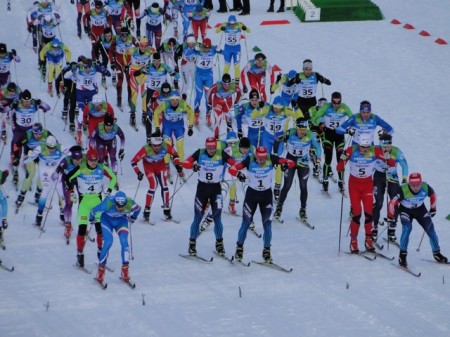
Australia sends its national team, for example – and according to Boggs, some of her skiers can hang with them.
“We compete clearly not at the World Cup level because we’re just not there,” she said. “But we compete with the other teams who are full-time students.”
Sierra Jech, a USCSA national champion who aspires to continue skiing after college, said that the experience helps her, and others, do better in their races back in the U.S.
“Once of the kids of that team is someone who started skiing in college,” she said. “I know he was extremely nervous… It’s more helpful in the NCAA races that we go to. The ones where just hanging on is hard. I’m more excited for them now than stressed out and nervous.”
Boggs and her co-coach Rachel Watson say that they can watch their athletes grow before their very eyes at the Games.
“It’s entirely life-shaping,” Watson said. “Increased poise, an ability to handle stressful situations, maturity, and definitely changes in the way they approach what would be a more stressful race at home – it no longer seems so stressful. It changes perspective.”
Who Makes the Decisions?
According to Boggs, the trip costs about $3500 per person. Part of that is airfare, and part goes to BTI – a trip company contracted by the US-IUSF to arrange everything for the teams going to the Games.
And therein lies the rub for other college athletes who might like to attend: who can organize a trip where the money is due more than six months ahead of time?
Most countries have some sort of selection criteria and send their fastest skiers who are registered students. The event is on par with the competition level of World Junior Championships or U23 World Championships (even more so in biathlon, where an actual senior World Championships medalist hit the podium; few North Americans compete because biathlon is not a college sport).
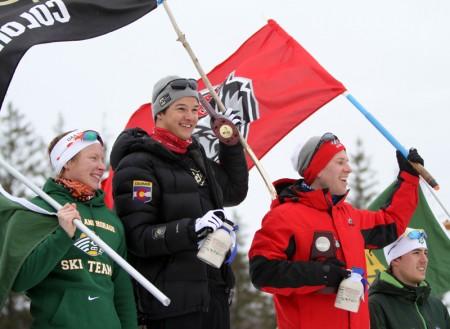
A number of European skiers who race at U.S. colleges always attend, as do the fastest students from Scandinavia, France, and Germany; Canadian skiers have sometimes spent time at a National Training Center or competed at age-level World Championships events before. But for American skiers of a similar caliber, the phrase “World University Games” probably isn’t even on the radar.
It wasn’t always so, and some college coaches are interested in sending athletes. Last year, most of the Denver University team attended, with Europeans representing their own countries and one American athlete traveling with UW. And coaches have tried to pull something together.
But the initial fee required by BTI presents a challenge. Athletes are likely not chosen months in advance, and there’s no organizing body to pay ahead of time and manage cash flow from competitors who commit come winter.
“[Michigan Tech coach] Joe Haggenmiller led a few of us into looking hard at access to the World University Games,” Dartmouth College women’s coach Cami Thompson wrote in an e-mail. “We met a few times and talked to the U.S. Ski and Snowboard Association (USSA) and the National Nordic Foundation (NNF) about helping with the trip. The issue is that the travel company… wanted $10K up front in early summer. As a loosely-knit group of college programs, we don’t have access to that money and while NNF was willing to work with us to try and figure it out – in the end it was time sensitive and just didn’t happen.”
Contacted over e-mail, USSA Nordic Program Manager Joey Caterinichio said that her organization would be happy to have higher-caliber U.S. athletes go, but that USSA had no say in the decision-making process. She couldn’t remember the name of the US-IUSF or BTI.
“It’s simple,” she wrote. “It’s not a USSA managed event. He who can pay the deposit by a certain date wins. There is no criteria.”
Caterinichio explained that she had been involved in trying to draft selection criteria for a team made up of top NCAA skiers, but like Thompson, said that the deal just fell through.
However, Thompson suggested that USSA was less than 100% supportive of a World University Games trip.
“USSA is reluctant to support it if it means some top athletes choosing that over U23 Champs,” she wrote.
Regardless of the many reasons that a top-level team doesn’t attend the Games, it means the U.S. is missing a valuable development opportunity. For a country that frequently laments a lack of international experience for its skiers, and the long time it might take some athletes to get used to racing in Europe, that seems like a loss.
“I would certainly support any athletes who were interested in going, if it made sense from an athletic/financial standpoint,” Thompson wrote.
Lifelong Experience
Nobody at UW says that paying the fees to BTI is easy. The team receives some money from the university because the trip is run as a class and can thus receive funding as a study-abroad type trip. The rest of it comes from hours and hours of fundraising and volunteer work.
But they can do it, so, as Caterinichio says, they get to go.
And that might be perfect. Fierce competition is not the only focus of the University Games. The university federation (FISU) which organizes summer and winter Universiades has this as its philosophy:
“The FISU (International University Sports Federation) was formed within university institutions in order to promote sports values and encourage sports practice in harmony with and complementary to the university spirit. Promoting sports values means encouraging friendship, fraternity, fair-play, perseverance, integrity, cooperation and application amongst students, who one day will have responsibilities and even key positions in politics, the economy, culture and industry. As allies or competitors, perhaps even as antagonists, these men and women will have learned how to collaborate and deal with every eventuality, whilst respecting the ethical code enshrined in these values. Promoting sports values and sports practice also implies giving a new dimension to the university spirit in study, research, and discipline, through the strong affirmation of the full humanist development of the individual and of society at large. This development is not just intellectual, but also moral and physical.”
In that sense, the UW team is a genius fit for the event. For instance, the co-coaches’ decision to make the trip into a class fulfills many of those goals.
Purpose/need/justification of project:
In January 2015, the Nordic Ski Team at the University of Wyoming will attend the World University Games (WUG) in !trbské Pleso, Slovakia. The host country had only one year to prepare for this large-scale competition including accommodations, food, and transportation for over 1800 athletes, delegation members, and spectators.[1] Large sporting events like WUG have major impacts including: changes to the local economy, carbon emissions, increased waste generation, and personal impacts on community members. [2] These impacts all sum to create a “footprint” at both the local and global levels. This project as a whole aims to provide an analysis on each of these individual impacts and to examine our team’s footprint at WUG by taking environmental, societal, and economic perspectives.
“We also have a class because we feel like it makes the experience a lot richer, and makes them consider things a lot more if they are not just ski racing, but they’re also involved in some curriculum,” Boggs said.
She was careful to say that much of the actual work involved in the class is done before or after the trip itself, because the skiers do focus on racing when they are at the event.
But some activities, like blogging and journaling, actually help them focus their energies.
“Last year we had a class as well, and we just had a blog and focused on journaling during the event,” Jech said. “That really spurred us to want to do more. It was definitely beneficial.”
And the trip provides a very unique experience, one that Watson and Boggs say is so important that they’ve decided to keep doing international trips even after the point if/when they are no longer asked to do the World University Games.
“We’re taken people to the Games that have never been on planes, or have never been out of Wyoming, or have certainly never been to Europe, ever,” Boggs said. “That kind of experience is huge for young people.”
Ultimately, Boggs and Watson hope that many of their athletes will stay involved in sport. They have seen results: when they travel to races inside and outside of Wyoming, they see many alumni either racing or coaching.
The trip to World University Games helps with that.
“It definitely made me realize that it’s possible to keep skiing and keep improving, even if it’s – college seems like the end for a lot of skiers,” Jech concluded. “This is definitely an event that inspires me to keep skiing. And I know that inspires other people to keep pushing, and to become coaches.”
Chelsea Little
Chelsea Little is FasterSkier's Editor-At-Large. A former racer at Ford Sayre, Dartmouth College and the Craftsbury Green Racing Project, she is a PhD candidate in aquatic ecology in the @Altermatt_lab at Eawag, the Swiss Federal Institute of Aquatic Science and Technology in Zurich, Switzerland. You can follow her on twitter @ChelskiLittle.


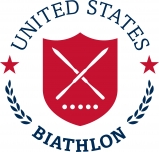
One comment
Pingback: For Some Countries, World University Games Offers Bragging Rights; For University of Wyoming, It’s the Trip of a … |